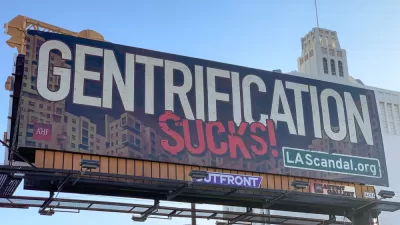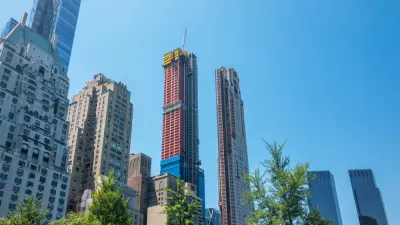A decade of relentless, and exhausting, opposition by those "who saw democracy being trampled in the interest of a developer whose methodology they found offensive," has taken its toll on the ranks of opponents to Brooklyn's Atlantic Yards project.
N. R. Kleinfield profiles the diminishing ranks of activists dedicated to opposing the monumental Atlantic Yards project, as a "long, losing battle" has caused some of the project's most dedicated opponents to "hang up [their keyboards]." With the Barclays Center arena, the project's anchor, now completed, but much of the $4.9 billion project unfinished, many of those who invested dozens of hours a week to fighting the project are going back to their normal rhythms.
"Facing symptoms of exhaustion, many are trying to reclaim their lives," says Kleinfield. "Some sought peace by resettling dozens of blocks or thousands of miles away. But many others, especially those living in the shadow of the arena, wonder if they ever can disentangle themselves from a confrontation without an obvious endpoint."
"The first person to raise alarms was Patti Hagan, 69, who lives two blocks from the arena. She had a falling out with other opposition leaders (“excommunicated,” as she put it). She used to spend 40 hours a week raging against the development, and now estimates she puts in maybe two."
"She is restoring a brownstone, writing and going to jazz concerts again."
Not all, however, have given up the fight. "Norman Oder, a journalist writing a book on the project, remains its most indefatigable chronicler with his long-standing blog, Atlantic Yards Report, for which, he said, he has no expiration date." Others plan to keep protesting in their small way, by vowing to never set foot in the new arena.
FULL STORY: Opponents of Atlantic Yards Are Exhausted by a Long, Losing Battle

Alabama: Trump Terminates Settlements for Black Communities Harmed By Raw Sewage
Trump deemed the landmark civil rights agreement “illegal DEI and environmental justice policy.”

Planetizen Federal Action Tracker
A weekly monitor of how Trump’s orders and actions are impacting planners and planning in America.

Why Should We Subsidize Public Transportation?
Many public transit agencies face financial stress due to rising costs, declining fare revenue, and declining subsidies. Transit advocates must provide a strong business case for increasing public transit funding.

Understanding Road Diets
An explainer from Momentum highlights the advantages of reducing vehicle lanes in favor of more bike, transit, and pedestrian infrastructure.

New California Law Regulates Warehouse Pollution
A new law tightens building and emissions regulations for large distribution warehouses to mitigate air pollution and traffic in surrounding communities.

Phoenix Announces Opening Date for Light Rail Extension
The South Central extension will connect South Phoenix to downtown and other major hubs starting on June 7.
Urban Design for Planners 1: Software Tools
This six-course series explores essential urban design concepts using open source software and equips planners with the tools they need to participate fully in the urban design process.
Planning for Universal Design
Learn the tools for implementing Universal Design in planning regulations.
Caltrans
Smith Gee Studio
Institute for Housing and Urban Development Studies (IHS)
City of Grandview
Harvard GSD Executive Education
Toledo-Lucas County Plan Commissions
Salt Lake City
NYU Wagner Graduate School of Public Service





























